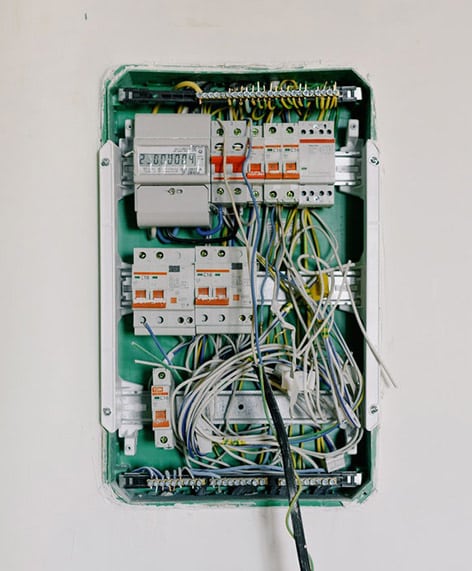Ensure your electrical devices meet the essential health and safety requirements of the EU Low Voltage Directive (2014/35/EU). F2 Labs offers testing including dielectric strength, leakage current, EMC, and full technical file support to achieve CE marking and regulatory readiness.
Low Voltage Directive (LVD) 2014/35/EU Testing
Low Voltage 2014/35/EU, formerly 2006/95/EC
Electrical products that have a voltage rating within the below parameters can be subject to the Low Voltage Directive 2014/35/EU, formerly 2006/95/EC:
- 50 – 1,000 volts for AC devices
- 75 – 1,500 volts for DC devices.
DC devices that charge using an AC adapter are also subject to the LVD, even if the voltage is less than 75 volts DC.
Conformity to the Low Voltage Directive is mandatory if your product is within the voltage limits and not excluded specifically by the law (the Low Voltage Directive is a European law). Note that if your product is not within these voltages it may still be subject to other laws: most notably the General Product Safety Regulation 2023/988.
LVD compliance is not assured by using all CE-marked components. That is the starting point and the device itself must carry a CE mark that indicates the overall assembly, tested and evaluated as a single unit, is in legal compliance with the Low Voltage Directive.
F2 Labs can perform the required evaluation and CE mark testing to ensure compliance with the Low Voltage Directive 2014/35/EU, formerly 2006/95/EC. Our engineers will work with you, one-on-one, in cases of non-compliance in order to resolve any issues.
We are an accredited third party testing lab and our technical report(s) will satisfy the legal requirement to supply test reports (2014/35/EU, formerly 2006/95/EC, Annex IV (3)) if the European Market Surveillance Authorities make a formal request for your Technical File.
F2 Labs is regularly engaged in helping US manufacturers throughout the CE marking process; beginning with the determination of applicable EU Directives, suggesting appropriate EN standards for testing, performing the testing, and preparing the technical and legal documentation you will be required to store and/or present to the European authorities.
As your safety testing laboratory, we are ready to help you with your project – whether you are in the design or bid phase of the project or have equipment ready to ship. Call us today.
Helpful Link:
Here are just some of the standards we can evaluate to:
Safety requirements for electrical equipment for measurement, control, and laboratory use — Part 1: General requirements
What is the Low Voltage Directive (LVD) 2014/35/EU?
The Low Voltage Directive (LVD) 2014/35/EU ensures the safety of electrical equipment within specific voltage limits. It applies to:
- AC devices with a voltage rating between 50 – 1,000 volts
- DC devices with a voltage rating between 75 – 1,500 volts
This directive replaces the earlier 2006/95/EC regulation and sets essential safety standards for electrical products in the European Union.
Which Products are Subject to the LVD?
Products falling within the specified voltage ranges are subject to the LVD, including:
- AC devices: 50 – 1,000 volts
- DC devices: 75 – 1,500 volts
- DC devices charging via an AC adapter: Even if the DC voltage is below 75 volts, they are still subject to the LVD
Is LVD Compliance Mandatory?
Yes, compliance with the Low Voltage Directive is mandatory for all products within the defined voltage ranges unless explicitly excluded by law.
Does Using CE-marked Components Guarantee LVD Compliance?
No. While CE-marked components are a good starting point, the final product must:
- Be tested and evaluated as a single unit
- Meet LVD requirements to legally carry the CE mark
How Can F2 Labs Assist with LVD Compliance?
F2 Labs offers comprehensive support for LVD compliance, including:
- Performing required evaluations and testing
- Providing engineering support to resolve non-compliance issues
- Assisting with the preparation of technical and legal documentation required by European authorities
What is the Importance of Third-Party Testing for LVD Compliance?
Third-party testing, such as that provided by F2 Labs, ensures:
- Accredited evaluations that satisfy legal requirements
- Legally valid test reports, which are crucial if European Market Surveillance Authorities request your Technical File for inspection
What Standards Can F2 Labs Evaluate for LVD Compliance?
F2 Labs evaluates electrical products for LVD compliance against numerous EN standards, including:
- EN 60065-1
- EN 60335-1
- EN 60598-1
- EN 60730-1
- EN 60950-1
- EN 61010-1
- EN 62368-1
…and others, depending on the product and application.
How to Begin the Process of LVD Compliance Testing with F2 Labs?
To begin, contact F2 Labs for assistance. We guide you through the entire CE marking process, including:
- Identifying applicable EU Directives
- Conducting compliance testing
- Preparing necessary documentation
Whether you are in the design phase, bid phase, or have equipment ready to ship, F2 Labs ensures a smooth path to LVD compliance.
